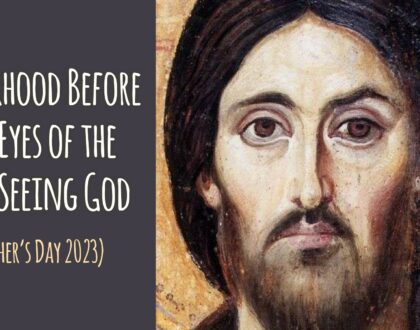Mark 6:45-52

by Pastor Gene
“Immediately he made his disciples get into the boat and go before him to the other side, to Bethsaida, while he dismissed the crowd. 46 And after he had taken leave of them, he went up on the mountain to pray. 47 And when evening came, the boat was out on the sea, and he was alone on the land. 48 And he saw that they were making headway painfully, for the wind was against them. And about the fourth watch of the night he came to them, walking on the sea. He meant to pass by them, 49 but when they saw him walking on the sea they thought it was a ghost, and cried out, 50 for they all saw him and were terrified. But immediately he spoke to them and said, “Take heart; it is I. Do not be afraid.” 51 And he got into the boat with them, and the wind ceased. And they were utterly astounded, 52 for they did not understand about the loaves, but their hearts were hardened.”
- Mark provides us with a remarkable detail in his account of this story. He says that “about the fourth watch of the night He [Jesus] came to them [the disciples], walking on the sea. He meant to pass by them.” Huh? Why? What does Mark mean that He “meant to pass by them”? What possible reason could He have for doing that?
- Mark 6:48 says that Jesus saw that the disciples “were making headway painfully, for the wind was against them.” One translation says they were “straining at the oars” (NASB); another says they were “straining at rowing” (NKJV). Can you relate? What were some of the times you felt like that in your life?
- Jesus saw the disciples struggling and “came to them” (Mark 6:48), but the details are telling! What can we learn from the fact that He came to them in “the fourth watch of the night” (3-6 a.m.)? Or that He came “walking on the sea”? Or that He came at all?
- Their response, though not difficult to understand, lacked faith. How does this resemble our response to the Lord at times?
- “It is I” in 6:50 is literally, “I AM” in the Greek text. How does this change the story? How might it help us to understand that “He meant to pass by them”? Has God done any ‘passing by’ before?
- There are seven “I AM” statements on John’s Gospel where Jesus metaphorically claims to ‘be’ something – like “THE Door” or “THE True Vine.” Look up each one of these, consider the context, and consider what the Lord is claiming in each: 1. 6:35, 41, 48, 51; 2. 8:12; 9:5; 3. 10:7-9; 4. 10:11, 14; 5. 11:25; 6. 14:6; 7. 15:1, 5.
- Furthermore, there are three places in John’s Gospel where Jesus uses “I AM” in a way that is NOT a metaphor (6:20, 8:58 & 18:4–5). What is He saying in these very important verses?
Recommended Posts

Reflection Questions: Fatherhood Before the Eyes of the All-Seeing God (Father’s Day 2024)
June 16, 2024


